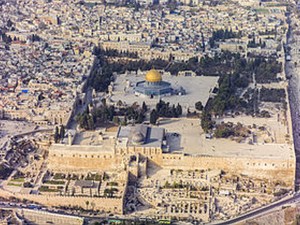“Awkward, especially when we’re trying to ingratiate ourselves to other progressive activist groups.”
 New York, August 31 – Preparations for the upcoming High Holidays in numerous progressive synagogues and temples have prompted more anxiety in 2020 than in years past, owing both to the social distancing restrictions that might hamper attendance, and to the discovery that one of the important liturgical texts of Rosh HaShanah, the Jewish New Year, features a prophetic vision of Jewish redemption and ingathering that speaks of Jewish worship on a site that those progressives see as off-limits to such rites lest they offend Muslims, a cardinal sin.
New York, August 31 – Preparations for the upcoming High Holidays in numerous progressive synagogues and temples have prompted more anxiety in 2020 than in years past, owing both to the social distancing restrictions that might hamper attendance, and to the discovery that one of the important liturgical texts of Rosh HaShanah, the Jewish New Year, features a prophetic vision of Jewish redemption and ingathering that speaks of Jewish worship on a site that those progressives see as off-limits to such rites lest they offend Muslims, a cardinal sin.
One prominent verse recited in the Musaf prayer comes from the book of Isaiah, a passage in which the eighth-century-BCE prophet foresees the End of Days deliverance manifest in Jews returning to Jerusalem from all over and bowing to the Lord on “the Holy Mountain,” a reference to the plateau that has featured a mosque since the Muslim conquest of the city in the early eight century CE, but where two Jewish holy temples had stood in classical and late antiquity. Progressives find that verse challenging in light of Isaiah’s own emphasis on justice, a favorite progressive cause for groups they consider oppressed or marginalized, foremost among them the Palestinians.
“It’s often enough to say the last twenty-seven chapters of Isaiah are a different author,” explained Rabbi Andy Kahn of Temple Emmanuel, referring to the bulk of the book’s passages containing visions of a redeemed, repopulated Jewish Jerusalem. “But the verse in question here comes from earlier in the book, so that doesn’t apply. We also like to quote many justice-oriented verses from the first part of the book, such as ‘Zion will be redeemed through judgment, and her returnees through justice,’ but that only begs the question, because it refers to ‘Zion’ as worthy of redemption, and well, I don’t have to tell you our attitude on Zion and Zionism. In many ways progressive Judaism is returning to its nineteenth-century and early-twentieth-century roots in disavowing any Jewish connection to an ancestral Jewish homeland, but it’s hard to make a compelling case for that when all the sources we quote, even the ones we like to cherry-pick, presuppose Jewish sovereignty in the ancestral Jewish homeland as a redemptive value, a positive aspiration. Awkward, especially when we’re trying to ingratiate ourselves to other progressive activist groups.”
“To counteract that problematic phenomenon, we have to go pretty far in the other direction,” added Yonah Lieberman of If Not Now. “We will sound the shofar, in keeping with the tradition of the day, bur we will stand outside a Chabad House to do so, holding placards announcing that we produce those blasts from the ram’s horn in protest and in solidarity with Muslims whose displacement of Jews and subsequent imposition of Apartheid-like policies on religious minorities under their rule doesn’t count because otherwise I can’t feel important and virtuous for opposing the mainstream of my community and tradition.”
Please support our work through Patreon.




